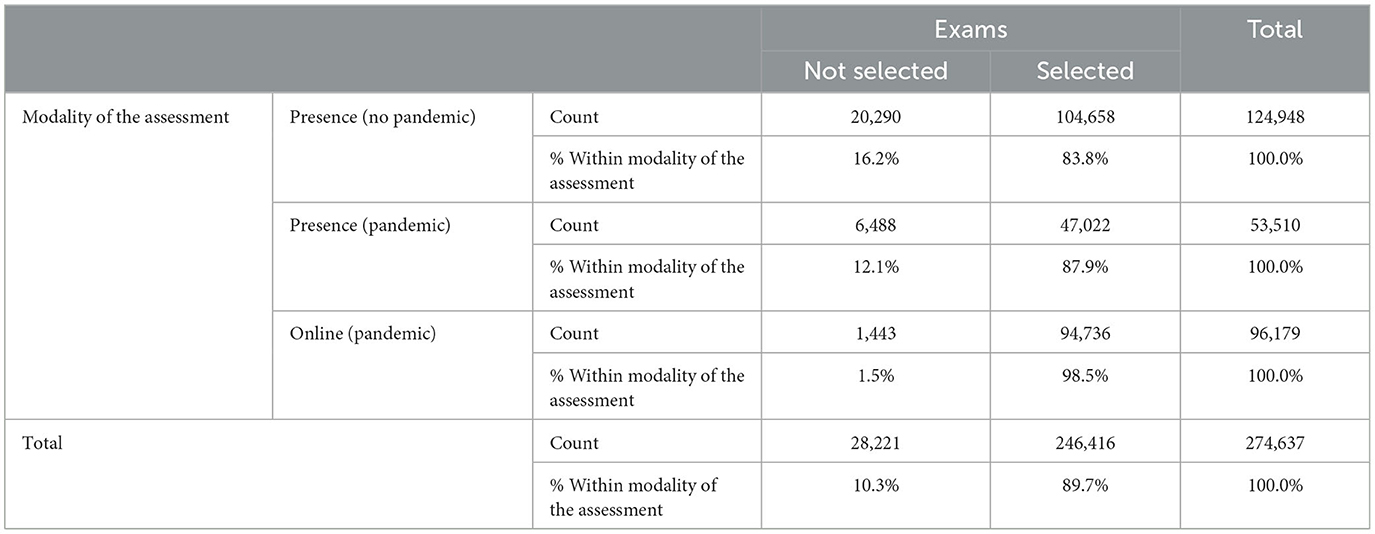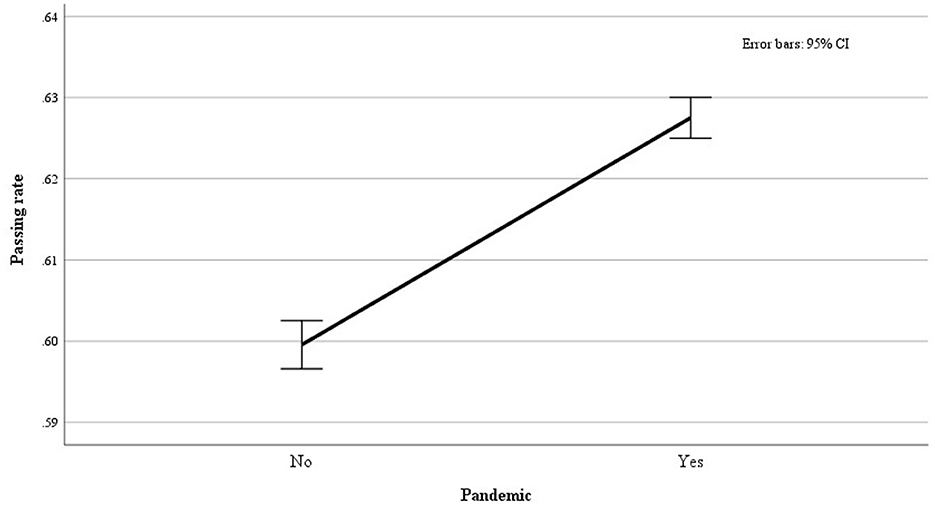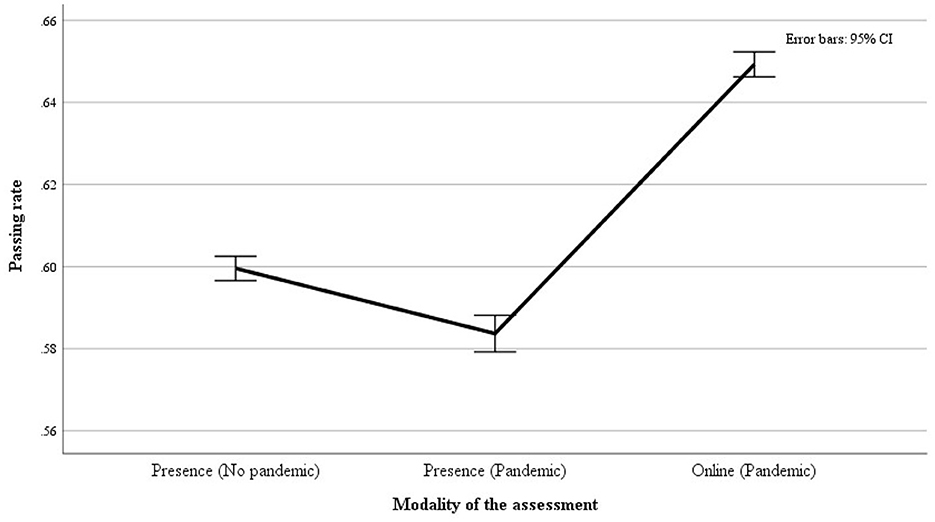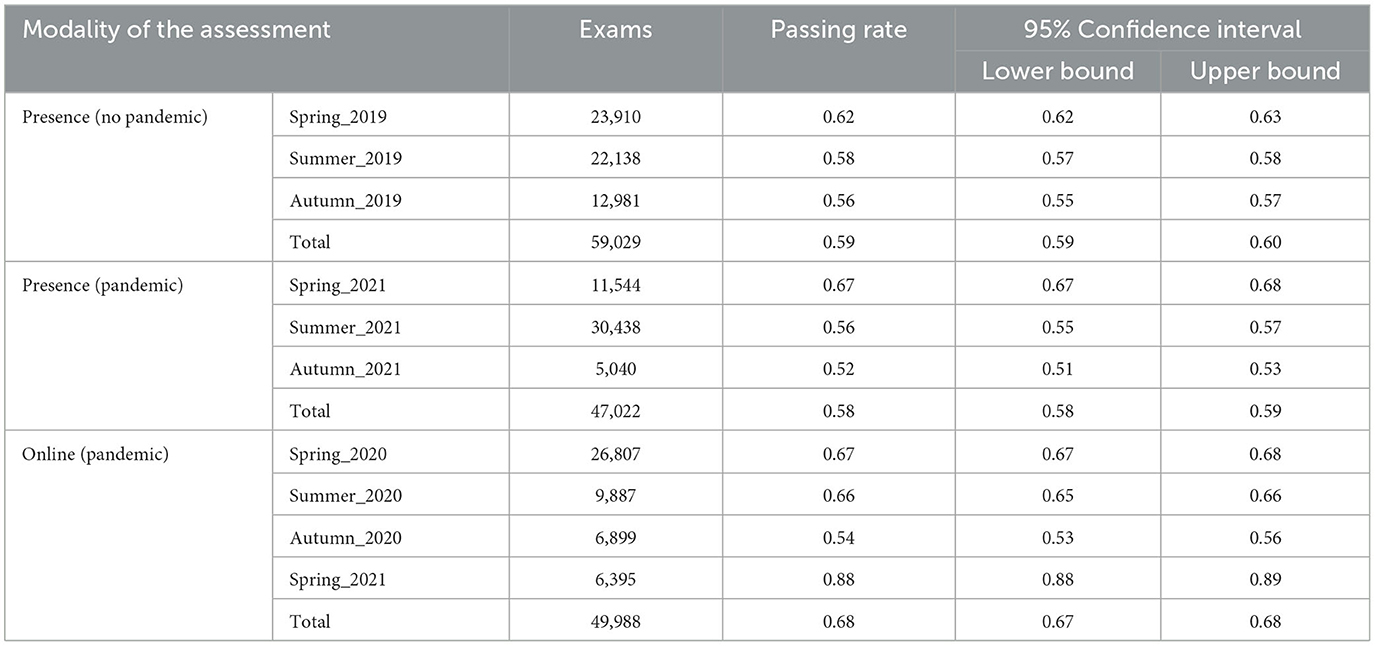- 1Department of Cognitive Sciences, Psychology, Education and Cultural Studies, University of Messina, Messina, Italy
- 2Department of Philosophy and Communication, University of Bologna, Bologna, Italy
- 3Department of Psychology and Neurosciences, Leibniz Research Centre for Working Environment and Human Factors at TU Dortmund, Dortmund, Germany
- 4Bielefeld University, University Hospital OWL, Protestant Hospital of Bethel Foundation, University Clinic of Psychiatry and Psychotherapy, University Clinic of Child and Adolescent Psychiatry and Psychotherapy, Bielefeld, Germany
- 5Dipartimento di Psicologia “Renzo Canestrari”, Alma Mater Studiorum Università di Bologna, Cesena, Italy
- 6Neuropsychology and Cognitive Neuroscience Research Center (CINPSI Neurocog), Universidad Católica del Maule, Talca, Chile
Introduction: Survey studies yield mixed results on the influence of the COVID-19 pandemic on academic performance, with limited direct evidence available.
Methodology: Using the academic platform from the Italian university system, a large-scale archival study involving 30,731 students and 829 examiners encompassing a total of 246,416 exams (oral tests only) to scrutinize the influence of the COVID-19 pandemic on the likelihood of passing exams was conducted. Examination data were collected both in face-to-face and online formats during the pandemic. In the pre-pandemic period, only face-to-face data were accessible.
Results: In face-to-face examination, we observed a lower probability of passing exams during the pandemic as opposed to pre-pandemic periods. Notably, during the pandemic we found an increased chance of passing exams conducted through online platforms compared to face-to-face assessments.
Discussion and conclusions: These findings provide the first direct evidence of an adverse impact of the COVID-19 pandemic on academic performance. Furthermore, the results align with prior survey studies underscoring that using telematics platforms to evaluate students' performance increases the probability of exam success. This research significantly contributes to ongoing efforts aimed to comprehend how lockdowns and the widespread use of online platforms impact academic assessment processes.
Introduction
The COVID-19 pandemic has forced nations to undergo significant restructuring across economic, health and educational systems. Recent psychological research, spanning the past 3 years, has started to illuminate the impact of prolonged exposure to a pandemic along with associated lockdowns and home confinement on cognitive and affective processing (e.g., Diotaiuti et al., 2021, 2023; Fiorenzato et al., 2021; Wilke et al., 2021; Gewalt et al., 2022; Rania et al., 2022). For example, Fiorenzato et al. (2021), documented an increase in the severity and prevalence of conditions such as depression, anxiety disorders, abnormal sleep, appetite changes, decreased libido, and health-related anxiety in the pandemic. On the cognitive level, the authors reported a paradoxical improvement in memory, compared to pre-lockdown. However, the authors of this study reported subjective complaints of the participants with respect to daily activities involving attention, temporal orientation, and executive functions. This highlights that the effects of the pandemic on mental processes extend to both affective and cognitive dimensions.
The spread of the COVID-19 pandemic has exposed education systems to unprecedented challenges, with a sudden shift of classroom-based pedagogics to distant learning approaches (Aldossari and Chaudhry, 2021). This transition from face-to-face to virtual classes has resulted in a diverse spectrum of educational models: on the one hand, some professors replicated their in-person classes through videoconferencing, while, on the other hand, others undertook a comprehensive overhaul of their teaching plans to align methodological and evaluative strategies with the demands of the new context (Fardoun et al., 2020; Ramos-Pla et al., 2021). For instance, there's an observable trend of increasing collaborative work (Ramos-Pla et al., 2022), which enhances professor-student interactions—a critical predictor of students' perceived quality of teaching (del Arco et al., 2021). In response to this paradigm shift, training centers across various universities adapted their programs to facilitate the continuous learning of professors. However, these educators faced challenges, expressing concerns about the time constraints in assimilating new knowledge into their teaching practices and the complexities of online evaluations (Ramos-Pla et al., 2021). Moreover, other studies underscored students' difficulties in following online courses, particularly those without personal devices or sharing them with other family members (Ramos-Pla et al., 2023).
In the present study, we focused on academic assessment, a pivotal sector significantly impacted by the pandemic (Onyema et al., 2020; Rashid and Yadav, 2020; Estrada Guillén et al., 2022; Gewalt et al., 2022). This sector witnessed an extensive adoption of telematic technologies and was a dynamic response to ensure the continuity of educational services, including university services.
To the best of our knowledge, the existing literature (e.g., Mahdy, 2020; Radu et al., 2020; Son et al., 2020; Akin-Odanye et al., 2021; Andersen et al., 2022; Appleby et al., 2022; Hadwin et al., 2022) exploring the impact of the COVID-19 pandemic on academic performance is based on conventional survey research methodology. For instance, Mahdy (2020) examined the academic performance of veterinary medical students during the pandemic by collecting their opinions via an online Google form questionnaire. The author pointed out that while online education offers an opportunity for self-study, the main pandemic-related challenge in veterinary medical science is how to give practical lessons. Moreover, the study by Estrada Guillén et al. (2022) identified a connection between emotional intelligence and resilience to pandemics, which was associated with better academic performance. This can help to explain the mixed results provided by the literature in the field (e.g., Gonzalez et al., 2020; Giusti et al., 2021; Keržič et al., 2021).
Traditional–internet-based survey panels are characterized by several limitations such as response or sampling biases, desirability biases, and memory recall biases (Andrade, 2020). Moreover, the sampled data might not be representative of the actual population (Hays et al., 2015), potentially yielding biased results.
In the current study, we aimed to overcome such limitations by examining actual data recorded and archived within our university multifunction academic (online) platform to answer a series of outstanding questions not addressable via survey studies. This platform serves as a comprehensive teaching management computer system, providing students and professors with a dedicated space to oversee exam registration, grade management, and participation in university initiatives. The wealth of information available through this platform includes details about the scheduling of all exams, and the outcomes of each student evaluated within our university. This dataset thus provides a more reliable and accurate picture of the impact of the COVID-19 pandemic on academic achievement compared to survey studies. Furthermore, these actual data serve as a robust alternative to subjective survey measures, which are susceptible to biases, including those stemming from social expectations. Finally, this dataset allowed us to explore whether and how the mode of examination (face-to-face vs. online platform) during the pandemic influences its impact.
Our focus was directed to data spanning the period between January 2019 and October 2021. This specific time frame facilitated a comparative analysis, allowing us to discern any differences between “in-person” and “online” examinations, both in the period just before and during the pandemic. Additional details are offered in the Methods section.
Methods
The data were extracted from the multifunction academic platform of the University of Messina. These data consisted of 246,416 assessments (exams) provided by 829 examiners. The evaluation involved 1,846 teaching courses. The data were collected over three academic years, from 2019 to 2021, and involved a total of 32,123 students [originating from 135 bachelor's/master's degrees and post-graduate specializations offered by the University of Messina (see Table 1)].
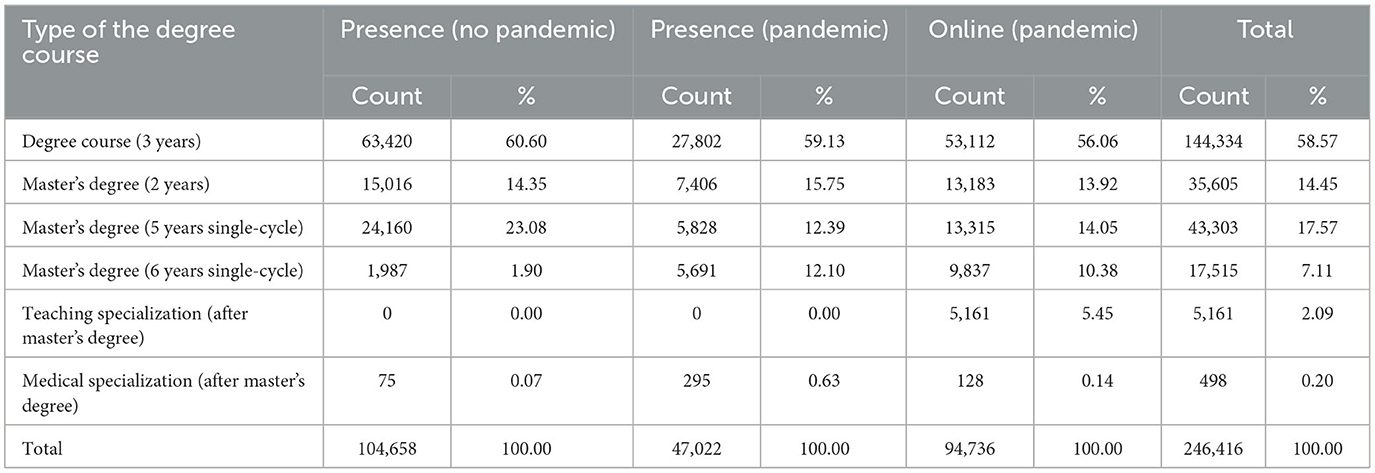
Table 1. Number of assessments and respective percentages per type of degree course before and during the COVID-19 pandemic.
The pre-pandemic period refers to exams from January 2019 to February 2020. The pandemic period refers to exams from March 2020 to October 2021. We choose to include a relatively extended time window for the pandemic condition as two modalities of examination (i.e., in presence and online) were implemented in this period. In contrast, only one (in person) was available in the pre-pandemic condition. We excluded data referring to mixed mode (online/in person) assessments, as it was not possible to disentangle the two modalities. Refer to Tables 2, 3 for more details.
The extracted data included the modality of the assessment session (online and in presence), the type of assessment (written and oral), and the respective outcome (passed or failed). Inclusion criteria for the final data analysis referred to only oral examinations. We excluded data referring to mixed mode (online/presence) assessments, as it was not possible to clearly disentangle the two modalities. We referred to rectoral decrees to determine when the exams were (or not) online or in the mixed mode. For privacy reasons, demographic data (e.g., age, sex, and country of origin) were not provided. The study was approved by the Local Ethics Committee (Protocol Number: COSPECS_08_2022). The ethics committee waived the requirement for consent as the study implied the analysis of already collected and anonymized data.
A typical oral exam session begins with verifying the student's identity. There is no standard way to conduct the exam. The assessor can start the session by asking the student to choose the topic from the general program of the course or by selecting the topic himself from those addressed in the course. The duration of the exam and the number of questions also vary depending on the assessor and the need to have a clear picture of the level of preparation of the student being examined. For data analysis we employed an approach to discern significant differences in pass rates between categories. Specifically, we utilized the prop.test() function in the R language, which conducts a hypothesis test to compare proportions. Internally, this function employs the chi-square test statistic for proportions. The version used for this analysis is R language ver. 4.2.
Results
First, the overall number of assessments during the pandemic was higher (N = 141.758) compared to the pre-pandemic period (N = 104.658). However, when looking separately at each type of degree course (Table 1), a reversed pattern of results (i.e., a lower number of assessments) is documented for the master's degree (5 years single cycle).
Table 4 provides the results of the statistical analysis when comparing the number of assessments before vs. during the pandemic for each type of degree course.
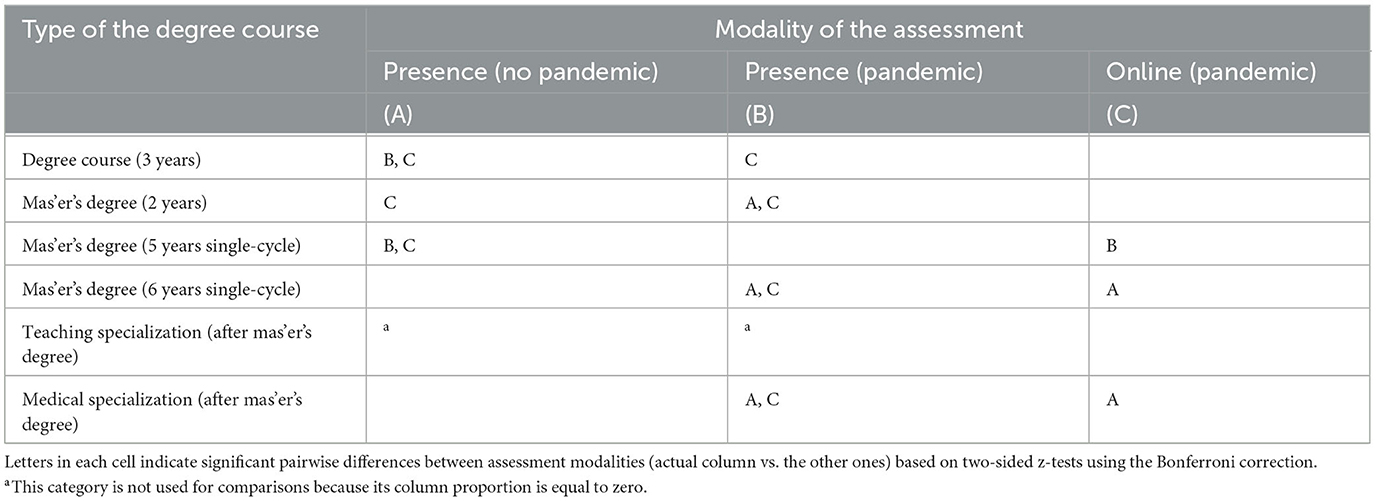
Table 4. Statistical comparisons of the number of assessments as a function of assessment modalities (A = in presence before the pandemic; B = in presence during the pandemic; C = online during the pandemic) for each type of degree course.
Considering the whole sample, the observed absolute number of passed exams was 151.702 out of 246.416, resulting in an overall pass rate of 0.62 (61.6%). Furthermore, we noted an overall higher chance of a favorable assessment during the COVID-19 pandemic compared to the pre-pandemic period (0.63 vs. 0.60) (Figure 1 and Table 5). However, a more mixed picture emerged when examining different assessment modalities. Specifically, during the COVID-19 pandemic, the chance for a favorable assessment was higher in the “online” modality (0.65) but notably lower in the “in presence” modality (0.58), compared to the pre-pandemic “in presence” assessments (0.60). This indicates that the pandemic negatively influenced academic performance, specifically when the assessment was conducted in the standard (i.e., in presence) setting. See Table 6 and Figure 2.
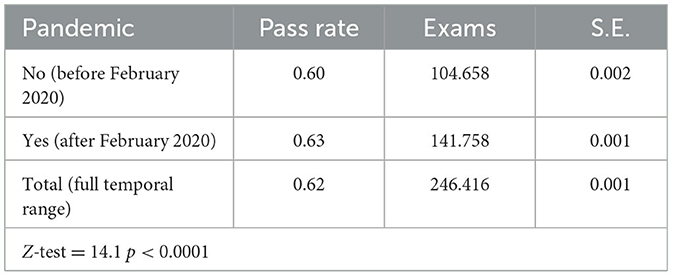
Table 5. Pass rate by the assessment modality: number of examinations, standard error (S.E.), and Z-test for equality of proportions.
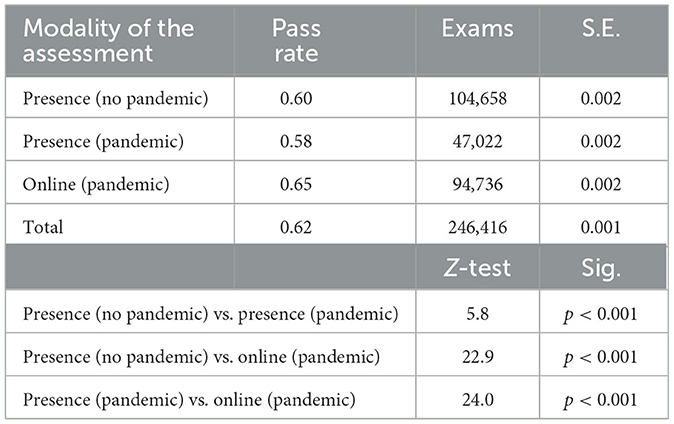
Table 6. Pass rate by modality of the assessment: number of examinations, the respective standard error (S.E.), and Z-test.
To account for potential season-related effects, we performed a further control analysis comparing passing rates between three consecutive years (2019, 2020, 2021) considering the same seasons for each of the 3 years. We excluded the winter season from the analysis because it encompassed both pre-pandemic and pandemic data, in accordance with the university's rectoral decree, which established the examination modality (online, face-to-face) for the entire institution. We examined the influence of seasons, and assessment modality on the likelihood/chance of a favorable assessment.
The results (two-sided Z-tests) confirm the pattern observed in the primary analysis, indicating a reduced likelihood of a favorable assessment in face-to-face settings during the pandemic (58%, p = 0.007), and an increased likelihood of a favorable evaluation online (during the pandemic, 68%, p < 0.001) compared to the pre-pandemic—face-to-face—setting condition (59%). See Table 7 for details on the different seasons.
Discussion
In this archival study we examined the impact of the COVID-19 pandemic on academic assessment outcomes, introducing several innovative elements compared to previous work in the field. Our approach combined direct empirical evidence about academic performance, a comprehensive archival analysis of large-scale data, and a comparison between face-to face and online assessments.
The first important finding is the significant difference of exam pass rates between face-to-face and online modalities. This has relevant practical implications for the landscape of academic assessment. In contrast to previous survey-based studies (e.g., Mahdy, 2020), our research, based on direct empirical evidence, demonstrates that the COVID-19 pandemic negatively affected academic assessments, specifically in a face-to-face setting. This is evident through a decreased pass rate in the “in person” assessments during the pandemic compared to the period before the outbreak. Crucially, this trend persists even when accounting for seasonal effects, and might be caused by an adverse impact of the COVID-19 pandemic on mental health (Salehinejad et al., 2020; Craparo et al., 2022; La Rosa et al., 2022; Vicario et al., 2023) and cognitive skills (Fiorenzato et al., 2021), which could have deleterious effects on academic performance.
In principle, the lower pass rate in “face-to-face” assessments during the COVID-19 pandemic may also be influenced negatively by attendance in online classes provided during the pandemic, which could have affected learning quality. However, we observed a higher pass rate for online assessments during the pandemic (but see discussion below), and evidence from other studies suggests that online platforms and other modalities for remote practices, such as clinical interventions (D'Oliveira et al., 2022; Prato et al., 2022) and remote learning (Al-Maroof et al., 2021) allow for effective outcomes. Therefore, although we do not dismiss the possibility that online lectures may have negatively affected learning in some students, our data and previous research (Al-Maroof et al., 2021) argue against attributing a causal role to this factor. On the other hand, “face-to-face” exams might have triggered heightened social stress, originating from prolonged isolation, which restricts social interactions. This, in turn, could have impacted students' cognitive performance and assessors' decision-making processes in the assessment (e.g., Starcke and Brand, 2012).
Other potential stressors, such as using facial masks, may have further reduced pass rates by interfering with student performance. The discomfort associated with face masking (e.g., Lazzarino et al., 2020; Tornero-Aguilera and Clemente-Suárez, 2021) has been shown to compromise cognitive performance and interfere with the occupational duties of workers (e.g., Shenal et al., 2012), and prolonged mask use can cause bilateral headaches (Ong et al., 2020). Face masks may compromise the positive effects of relational continuity (Wong et al., 2013). Additionally, facial masking reduces the recognition of emotions, potentially impacting social functioning (Grundmann et al., 2021).
The second major finding in this study is the higher pass rate observed in the online assessment condition during the pandemic, suggesting a potential advantage for students tested in this modality. Also, this outcome remains consistent even after accounting for seasonal effects, indicating that the utilization of online platforms for assessment could increase the likelihood of passing exams during the pandemic. It is important to note, however, that no data on online assessments conducted before the COVID-19 pandemic are available, making it challenging to determine whether the increased pass rate is solely due to the use of the online platform or reflects an interaction between this assessment modality and the unique circumstances of the pandemic.
The more favorable outcome in the online session could potentially be attributed to a reduction in social distress experienced by students. This hypothesis is supported by the study of Stowell and Bennett (2010), indicating that students who typically experience high levels of test anxiety in a classroom setting report reduced test anxiety when taking exams online. This might reflect an effective capacity to implement successful coping strategies crucial for an effective adaptation to unexpected circumstances associated with the ongoing pandemics (e.g., Zhao et al., 2022).
However, it is noteworthy that approximately one-third of students perceive e-exams as more stressful than in-person exams (Elsalem et al., 2020).
Additionally, it is essential to acknowledge that previous research has emphasized an increased likelihood of cheating in (online) exams when lacking proctoring mechanisms (as in this case) (e.g., Harmor and Lambrinos, 2008; see also Chiang et al., 2022, for a recent systematic review of academic dishonesty in online learning environments). This underscores the potential risk of undeserved promotion associated with the use of telematic tools. However, it is important to recognize the relevance of these technologies in supporting the continuity of teaching and academic assessment during the challenging circumstances posed by the COVID-19 pandemic.
Our study significantly contributes to understanding how the COVID-19 pandemic has influenced academic assessment, shedding light on both challenges and opportunities associated with online platforms. We provide direct evidence of the adverse effects of the COVID-19 pandemic on academic performance when exams are conducted in person. Conversely, the observed higher pass rate in the online condition, compared to the in-person conditions both before and during the pandemic, suggests a potential drawback of this assessment modality. This includes an increased likelihood for students to consult notes and teaching material in the absence of a supervision system, and/or a higher inclination of assessors toward positive evaluations. However, it is important to note that this statement, which represents the main limitation of our work, remains unverified, as our study did not encompass the condition of online assessment before the COVID-19 pandemic for a comparative analysis with that during the pandemic. Moreover, other limitations pertain to the absence of control for additional variables that could have influenced the results, such as variations in learning styles, assessment methodologies, and socio-cultural factors.
Conclusions
In conclusion, our study extends the existing body of research (e.g., del Arco et al., 2021; Diotaiuti et al., 2021; Ramos-Pla et al., 2021, 2022), underscoring the profound impact of the COVID-19 pandemic on academic assessments and the use of virtual classes. For face-to-face examinations, it documents a lower probability of passing an exam during the pandemic compared to pre-pandemic times. It also emphasizes disparities in pass rates between in-person and online assessments, indicating a higher likelihood of passing exams online compared to in-person. Potential factors that contribute to explaining these differences include the impact of the pandemic on students' mental wellbeing and/or the potential for academic dishonesty in online assessments. The discovery of a lower probability of passing exams during the pandemic compared to pre-pandemic times suggests educational institutions need to formulate resilient contingency plans, crucial for mitigating disruptions in academic assessments resulting from unforeseen events such as pandemics.
The finding that the use of online platforms for assessment may increase the likelihood of passing exams holds practical implications for assessment strategies. It unveils, among other considerations, the potential risk of overestimating student‘s knowledge of the subject matter, which needs to be addressed.
Data availability statement
The raw data supporting the conclusion of this article will be available by sending a formal request to COSPECS Department at ZGlwLmNvc3BlY3NAcGVjLnVuaW1lLml0.
Ethics statement
The studies involving humans were approved by Local Ethics Committee, Cospecs Department, University of Messina. The studies were conducted in accordance with the local legislation and institutional requirements. Written informed consent for participation was not required from the participants or the participants' legal guardians/next of kin because we used archival data to conduct our study.
Author contributions
CV: Conceptualization, Investigation, Methodology, Resources, Validation, Visualization, Writing – original draft, Writing – review & editing. MM: Conceptualization, Data curation, Formal analysis, Investigation, Methodology, Resources, Software, Supervision, Validation, Visualization, Writing – review & editing. PP: Conceptualization, Resources, Supervision, Visualization, Writing – review & editing. CL: Conceptualization, Writing – review & editing. MN: Methodology, Supervision, Validation, Writing – review & editing. AA: Conceptualization, Supervision, Validation, Writing – original draft, Writing – review & editing.
Funding
The author(s) declare that financial support was received for the research, authorship, and/or publication of this article. The University of Messina covered the publication expenses for this article through the APC initiative. AA was supported by Universidad Católica Del Maule (CDPDS2022).
Conflict of interest
The authors declare that the research was conducted in the absence of any commercial or financial relationships that could be construed as a potential conflict of interest.
Publisher's note
All claims expressed in this article are solely those of the authors and do not necessarily represent those of their affiliated organizations, or those of the publisher, the editors and the reviewers. Any product that may be evaluated in this article, or claim that may be made by its manufacturer, is not guaranteed or endorsed by the publisher.
References
Akin-Odanye, E. O., Kaninjing, E., Ndip, R. N., Warren, C. L., Asuzu, C. C., Lopez, I., et al. (2021). Psychosocial impact of COVID-19 on students at institutions of higher learning. Eur. J. Edu Stud. 8, 112–128 doi: 10.46827/ejes.v8i6.3770
Aldossari, M., and Chaudhry, S. (2021). Women and burnout in the context of a pandemic. Gender Work Organ. 28, 826–834. doi: 10.1111/gwao.12567
Al-Maroof, R. S., Alnazzawi, N., Akour, I. A., Ayoubi, K., Alhumaid, K., AlAhbabi, N. M., et al. (2021). The effectiveness of online platforms after the pandemic: Will face-to-face classes affect students' perception of their behavioural intention (BIU) to use online platforms? Informatics 8, 83. doi: 10.3390/informatics8040083
Andersen, S., Leon, G., Patel, D., Lee, C., and Simanton, E. (2022). The impact of COVID-19 on academic performance and personal experience among first-year medical students. Med. Sci. Edu. 32, 389–397 doi: 10.1007/s40670-022-01537-6
Andrade, C. (2020). The limitations of online surveys. Indian J. Psychol. Med. 42, 575–576. doi: 10.1177/0253717620957496
Appleby, J. A., King, N., Saunders, K. E., Bast, A., Rivera, D., Byun, J., et al. (2022). Impact of the COVID-19 pandemic on the experience and mental health of university students studying in Canada and the UK: a cross-sectional study. BMJ Open. 24, e050187. doi: 10.1136/bmjopen-2021-050187
Chiang, F.-K., Zhu, D., and Yu, W. (2022). A systematic review of academic dishonesty in online learning environments. J. Comp. Assesst Learn. 38, 907–928. doi: 10.1111/jcal.12656
Craparo, G., La Rosa, V. L., Commodari, E., Marino, G., Vezzoli, M., Faraci, P., et al. (2022). What is the role of psychological factors in long COVID syndrome? Latent class analysis in a sample of patients recovered from COVID-19. Int. J. Environ. Res. Public Health. 20, 494. doi: 10.3390/ijerph20010494
del Arco, I., Flores, Ò., and Ramos-Pla, A. (2021). Structural model to determine the factors that affect the quality of emergency teaching, according to the perception of the student of the first university courses. Sustainability 13, 2945. doi: 10.3390/su13052945
Diotaiuti, P., Valente, G., Mancone, S., Corrado, S., Bellizzi, F., Falese, L., et al. (2023). Effects of cognitive appraisals on perceived self-efficacy and distress during the COVID-19 lockdown: an empirical analysis based on structural equation modeling. Int. J. Environ. Res. Public Health. 20, 5294. doi: 10.3390/ijerph20075294
Diotaiuti, P., Valente, G., Mancone, S., Falese, L., Bellizzi, F., Anastasi, D., et al. (2021). Perception of risk, self-efficacy and social trust during the diffusion of COVID-19 in Italy. Int. J. Environ. Res. Public. Health. 18, 3427. doi: 10.3390/ijerph18073427
D'Oliveira, A., De Souza, L. C., Langiano, E., Falese, L., Diotaiuti, P., Vilarino, G. T., et al. (2022). Home physical exercise protocol for older adults, applied remotely during the COVID-19 pandemic: protocol for randomized and controlled trial. Front. Psychol. 13, 828495. doi: 10.3389/fpsyg.2022.828495
Elsalem, L., Al-Azzam, N., um'ah, A. A., Obeidat, N., Sindiani, A. M., and Kheirallah, K.A. (2020). Stress and behavioral changes with remote E-exams during the COVID-19 pandemic: a cross-sectional study among undergraduates of medical sciences. Ann. Med. Surgery. 60, 271–279. doi: 10.1016/j.amsu.2020.10.058
Estrada Guillén, M., Monferrer Tirado, D., and Rodríguez Sánchez, A. (2022). The impact of COVID-19 on university students and competences in education for sustainable development: emotional intelligence, resilience and engagement. J. Clean Prod. 380:135057. doi: 10.1016/j.jclepro.2022.135057
Fardoun, H., González-González, C., Collazos, C. A., and Yousef, M. (2020). Exploratory study in iberomaerica on the teaching-learning process and assessment proposal in the Pandemic. Educ. Knowl. Soc. 21, 1–9. doi: 10.14201/eks.23537
Fiorenzato, E., Zabberoni, S., Costa, A., and Cona, G. (2021). Cognitive and mental health changes and their vulnerability factors related to COVID-19 lockdown in Italy. PLoS ONE 16, e0246204. doi: 10.1371/journal.pone.0246204
Gewalt, S. C., Berger, S., Krisam, R., and Breuer, M. (2022). Effects of the COVID-19 pandemic on university studets' physical health, mental health and learning, a cross-sectional study including 917 students from eight universities in Germany. PLoS ONE. 17, e0273928. doi: 10.1371/journal.pone.0273928
Giusti, L., Mammarella, S., Salza, A., Del Vecchio, S., Ussorio, D., Casacchia, M., et al. (2021). Predictors of academic performance during the Covid-19 outbreak: impact of distance education on mental health, social cognition and memory abilities in an Italian university student sample. BMC Psychol. 9, 142. doi: 10.1186/s40359-021-00649-9
Gonzalez, T., de la Rubia, M. A., Hincz, K. P., Comas-Lopez, M., Subirats, L., Fort, S., et al. (2020). Influence of COVID-19 confinement on students' performance in higher education. PLoS ONE 15, e0239490. doi: 10.1371/journal.pone.0239490
Grundmann, F., Epstude, K., and Scheibe, S. (2021). Face masks reduce emotion-recognition accuracy and perceived closeness. PLoS ONE 16, e0249792. doi: 10.1371/journal.pone.0249792
Hadwin, A. F., Sukhawathanakul, P., Rostampour, R., and Bahena-Olivares, L. M. (2022). Do self-regulated learning practices and intervention mitigate the impact of academic challenges and COVID-19 distress on academic performance during online learning? Front. Psychol. 13, 813529. doi: 10.3389/fpsyg.2022.813529
Harmor, O. R., and Lambrinos, J. (2008). Are online exams an invitation to cheat? J. Econ. Edu. 39, 116–125. doi: 10.3200/JECE.39.2.116-125
Hays, R. D., Liu, H., and Kapteyn, A. (2015). Use of Internet panels to conduct surveys. Behav. Res. Methods 47, 685–690 doi: 10.3758/s13428-015-0617-9
Keržič, D., Alex, J. K., Pamela Balbontín Alvarado, R., Bezerra, D. D. S., Cheraghi, M., Dobrowolska, B., et al. (2021). Academic student satisfaction and perceived performance in the e-learning environment during the COVID-19 pandemic: evidence across ten countries. PLoS ONE. 16, e0258807. doi: 10.1371/journal.pone.0258807
La Rosa, V. L., Gori, A., Faraci, P., Vicario, C. M., and Craparo, G. (2022). Traumatic distress, alexithymia, dissociation, and risk of addiction during the first wave of COVID-19 in Italy: results from a cross-sectional online survey on a non-clinical adult sample. Int. J. Ment. Health Addict. 20, 3128–3144. doi: 10.1007/s11469-021-00569-0
Lazzarino, A. I., Steptoe, A., Hamer, M., and Michie, S. (2020). COVID-19: important potential side effects of wearing face masks that we should bear in mind. BMJ. 369, m2003. doi: 10.1136/bmj.m2003
Mahdy, M. A. A. (2020). The impact of COVID-19 pandemic on the academic performance of veterinary medical students. Front. Vet. Sci. 7, 594261. doi: 10.3389/fvets.2020.594261
Ong, J. J. Y., Bharatendu, C., Goh, Y., Tang, J. Z. Y., Sooi, K. W. X., Tan, Y. L., et al. (2020). Headaches associated with personal protective equipment - a cross-sectional study among frontline healthcare workers during COVID-19. Headache 60, 864–877. doi: 10.1111/head.13811
Onyema, E. M., Eucheria, N. C., Obafemi, F. A., Sen, S., Atonye, F. G., Sharma, A., et al. (2020). Impact of coronavirus pandemic on education. J. Educ. Pract. 11, 108–121. doi: 10.7176/JEP/11-13-12
Prato, A., Maugeri, N., Chiarotti, F., Morcaldi, L., Vicario, C. M., Barone, R., et al. (2022). Randomized controlled trial comparing videoconference vs. face-to-face delivery of behavior therapy for youths with tourette syndrome in the time of COVID-19. Front. Psychiatry 13, 862422. doi: 10.3389/fpsyt.2022.862422
Radu, M. C., Schnakovszky, C., Herghelegiu, E., Ciubotariu, V. A., and Cristea, I. (2020). The impact of the COVID-19 pandemic on the quality of educational process: a student survey. Int. J. Env. Res. Public Health. 17, 7770. doi: 10.3390/ijerph17217770
Ramos-Pla, A., del Arco, I., and Flores Alarcia, Ò. (2021). University professor training in times of COVID-19: analysis of training programs and perception of impact on teaching practices. Educ. Sci. 11, 684. doi: 10.3390/educsci11110684
Ramos-Pla, A., Reese, L., Arce, C., Balladares, J., and Fiallos, B. (2022). Teaching online: lessons learned about methodological strategies in postgraduate studies. Educ. Sci. 12, 688. doi: 10.3390/educsci12100688
Ramos-Pla, A., Requena, B. S., del Arco, I., Díaz, V. M., and Flores-Alarcia, Ò. (2023). Training, personal and environmental barriers of online education. Educar 59. 457–471. doi: 10.5565/rev/educar.1743
Rania, N., Pinna, L., and Coppola, I. (2022). Living with COVID-19: emotions and health during the pandemic. Health Psychol. Rep. 10, 212–226. doi: 10.5114/hpr.2022.115795
Rashid, S., and Yadav, S. S. (2020). Impact of COVID-19 pandemic on higher education and research. Indian J. Hum. Dev. 14, 340–343. doi: 10.1177/0973703020946700
Salehinejad, M. A., Majidinezhad, M., Ghanavati, E., Kouestanian, S., Vicario, C. M., Nitsche, M. A., et al. (2020). Negative impact of COVID-19 pandemic on sleep quantitative parameters, quality, and circadian alignment: implications for health and psychological well-being. EXCLI J. 19, 1297–1308. doi: 10.1101/2020.07.09.20149138
Shenal, B. V., Radonovich, L. Jr, Cheng, J., Hodgson, M., and Bender, B. S. (2012). Discomfort and exertion associated with prolonged wear of respiratory protection in a health care setting. J. Occup. Environ. Hygiene 9, 59–64. doi: 10.1080/15459624.2012.635133
Son, C., Hegde, S., Smith, A., Wang, X., and Sasangohar, F. J. (2020). Effects of COVID-19 on college students' mental health in the United States: interview survey study. Med. Internet Res. 22, e21279. doi: 10.2196/21279
Starcke, K., and Brand, M. (2012). Decision making under stress: a selective review. Neurosci. Biobehav. Rev. 36, 1228–1248. doi: 10.1016/j.neubiorev.2012.02.003
Stowell, J. R., and Bennett, D. (2010). Effects of online testing on student exam performance and test anxiety. J. Edu. Comp. Res. 42, 161–171. doi: 10.2190/EC.42.2.b
Tornero-Aguilera, J. F., and Clemente-Suárez, V. J. (2021). Cognitive and psychophysiological impact of surgical mask use during university lessons. Physiol. Behav. 234, 113342. doi: 10.1016/j.physbeh.2021.113342
Vicario, C. M., Makris, S., Culicetto, L., Lucifora, C., Falzone, A., Martino, G., et al. (2023). Evidence of altered fear extinction learning in individuals with high vaccine hesitancy during COVID-19 pandemic. Clin. Neuropsychiatry. 20, 364–369. doi: 10.36131/cnfioritieditore20230417
Wilke, J., Hollander, K., Mohr, L., Edouard, P., Fossati, C., González-Gross, M., et al. (2021). Drastic reductions in mental well-being observed globally during the COVID-19 pandemic: results from the ASAP survey. Front. Med. 8, 578959. doi: 10.3389/fmed.2021.578959
Wong, C. K., Yip, B. H., Mercer, S., Griffiths, S., Kung, K., Wong, M. C., et al. (2013). Effect of facemasks on empathy and relational continuity: a randomised controlled trial in primary care. BMC Fam. Pract. 14, 200. doi: 10.1186/1471-2296-14-200
Keywords: academic assessment, COVID-19 pandemic, online assessment, face-to-face assessment, archival study, archive statistical analysis
Citation: Vicario CM, Mucciardi M, Perconti P, Lucifora C, Nitsche MA and Avenanti A (2024) The impact of the COVID-19 pandemic on academic performance: a comparative analysis of face-to face and online assessment. Front. Psychol. 14:1299136. doi: 10.3389/fpsyg.2023.1299136
Received: 22 September 2023; Accepted: 18 December 2023;
Published: 09 January 2024.
Edited by:
Stefania Mancone, University of Cassino, ItalyReviewed by:
Stefano Corrado, University of Cassino, ItalyTosti Beatrice, University of Cassino, Italy
Anabel Ramos-Pla, University of Lleida, Spain
Maura Pilotti, Prince Mohammad Bin Fahd University, Saudi Arabia
Copyright © 2024 Vicario, Mucciardi, Perconti, Lucifora, Nitsche and Avenanti. This is an open-access article distributed under the terms of the Creative Commons Attribution License (CC BY). The use, distribution or reproduction in other forums is permitted, provided the original author(s) and the copyright owner(s) are credited and that the original publication in this journal is cited, in accordance with accepted academic practice. No use, distribution or reproduction is permitted which does not comply with these terms.
*Correspondence: Carmelo Mario Vicario, Y3ZpY2FyaW9AdW5pbWUuaXQ=
 Carmelo Mario Vicario
Carmelo Mario Vicario Massimo Mucciardi
Massimo Mucciardi Pietro Perconti
Pietro Perconti Chiara Lucifora
Chiara Lucifora Michael A. Nitsche3,4
Michael A. Nitsche3,4 Alessio Avenanti
Alessio Avenanti
